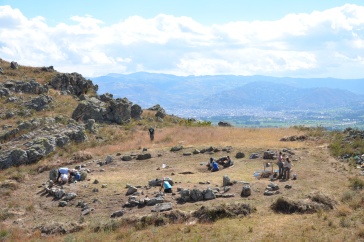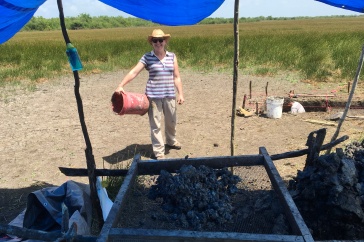
Professor Jeannie Sowers discusses a research project with Rory O'Neil '20 during one of their meetings at Dimond Library.
The destruction of essential infrastructure. Cholera outbreaks. A public health crisis.
Any one of these might seem overwhelming, but these are just some of the issues that make up the day-to-day reality throughout conflict zones in Yemen and Syria. This state of affairs, seemingly so far-removed from Durham, has inspired one sophomore to delve deep into research with one of UNH’s acclaimed professors.
Rory O’Neil '20, a political science and international affairs major, is working on a research project entitled “Targeting Infrastructure in the Middle East: Environment, Conflict and Law” with faculty mentor Jeannie Sowers, associate professor of political science and director of UNH’s international affairs program.

Making Research Possible
“I would not have been able to support Rory’s participation in the REAP program without prior UNH grant support for faculty research.”
Jeannie Sowers, like many UNH faculty members, is quick to applaud the support the university provides for excellence in research and, ultimately, education.
A fellowship from the UNH Center for Humanities provided coverage for her classes to give Sowers the time to work with her colleagues from other institutions to "conceptualize this project and start building a database tracking infrastructure destruction and apply for external funding,” she explains. “This spring we received a grant from a German foundation to support fieldwork and research assistance for the next two years.”
The group is also undertaking a new collaboration with Mike Palace and other geospatial scientists in UNH’s Earth Systems Research Center, thanks to two UNH initiatives: The MIST program through the College of Liberal Arts and the CoRE Initiative to support interdisciplinary working groups across colleges at the university.
“I’m very grateful to UNH for investing in faculty research so that we can support student research through wonderful programs like REAP and other programs run by the Hamel Center,” Sowers says.
Learn more about Sowers and her work in Research Without Borders.
O’Neil’s work is being conducted through the Research Experience and Apprenticeship Program (REAP) of the Hamel Center for Undergraduate Research. REAP “is a one-of-a-kind way for undergraduates to get acquainted with the process of research without being overwhelmed by the prospect,” the Nashua, New Hampshire, resident says. “It sets us up for engaging in future opportunities and career success."
Through REAP, O’Neil explains, she was able to explore the breadth of academic research in her field of political science and international affairs before embarking on a specific project. "I went into the research project process without a specific question in mind. Rather, I contacted various professors from UNH who had worked on projects or in fields that I found interesting," she says.
O’Neil’s next step was to meet with each professor and discuss their projects with an eye toward areas where she might assist. When she met with Sowers and learned about her research, she says, “I could not pass up the opportunity.”
“With fellow political scientists Erika Weinthal at Duke University and Neda Zawahri at Cleveland State, we have been tracking and analyzing the destruction of civilian infrastructure in the new Middle Eastern wars,” Sowers explains. “Rory joined an ongoing collaborative project and has added her own unique skills and angle to it.”
The subject matter is fascinating, O’Neil says, adding it is a perfect fit with the courses she has taken so far at UNH. “The breadth of the project also allows me some wiggle room on the focus of research. Not only do I aid Professor Sowers on research, but I can also explore my own questions that come up along the way,” she adds.
“Rory has been working on documenting how individuals and humanitarian organizations are trying to cope with this disaster. She is focusing on the outbreak of cholera, in particular, and on the collapsing civilian infrastructure more generally,” Sowers explains
O’Neil describes her part in the research process in three phases.
“First I gather and read sources that address or touch upon my research questions. This includes annotations and highlighting and cross-referencing that often lead me to more articles and papers,” she says, which can take up to a week or more. “The second step is to go back through all the collected literature and to compile a complete set of reading notes that serves as tentative answers to the proposed research questions,” she adds, explaining these also serve as an outline for her topic and “are constantly updated as new literature is found and added.” In the final stage, O’Neil uses all the data she has collected “to create a sort of abstract for each research question. The writing turns out to be around two pages of synthesized information that poses tentative answers and explanations for each question. This stage is used to put together organized thoughts and theories as well as to uncover where gaps in knowledge are, what questions still need to be asked and what topics need to be further explored. From there, the research starts over again from phase one, with refined questions and detailed focus.”

Sowers explains, “She has been collecting and analyzing primarily ‘grey literature’ — reports produced directly by international humanitarian organizations working on the ground, such as the International Committee of the Red Cross and Doctors Without Borders, among others. Together, we created a set of questions that she has been further researching and refining. Currently she is working her findings into an argument and drafting an article for publication in the UNH student journal Inquiry.”
O’Neil says she has been finding unexpected patterns: “The most fascinating discovery thus far has been the uncovering of cycles that are produced in — and are producing — conflict,” she explains. “The conflict itself causes families to adapt to the changing situations, but these adaptations are often negative in the sense that they are dignity-destroying or directly and indirectly help to prolong the conflict, which only prolongs the need for adaptation. For example, in Yemen, necessities like food and water are scarce and severely high-priced, while at the same time, unemployment is at record highs.”
The result?
“Yemeni citizens turn to outside sources for employment — such as militant or extremist groups and the black market,” O’Neil says. “This further undermines the stability of Yemen and legitimizes the continuation of the conflict.”
Documenting and understanding these causes and effects has real-world implications.
“The important question that arises from this finding is how NGOs and governments can adapt themselves to break this cycle of conflict and survival,” O’Neil says.
Classroom Connections

O’Neil’s research is proving to be a perfect fit with her dual major in political science and international affairs.
“Rory brought a combination of interests and skills to this research that have served her well,” Sowers says. “She is able to think creatively and connect how different impacts of the conflict interact together to create this humanitarian crisis.”
O’Neil’s major, as well as her coursework in public health and women’s studies, are an important part of that, Sowers says.
When she asked O’Neil to look into what is happening in Yemen with the spread of cholera, “she was able to bring a somewhat unique perspective to bear. She found, for instance, that because conditions are so dire, traditional gender roles are also disrupted, as men join women in the search for water and food and women take whatever jobs they find outside the home," Sowers explains. "Thinking about the gendered impacts of the conflict was an important contribution, as is her work on internal migration and displaced persons.”
O’Neil adds that UNH courses outside her particular field of study have also informed her work, with two of her Discovery Program courses proving especially helpful.
“The first was Honors Global Public Health Issues taught by professor Rosemary Caron. I was surprised to discover how many connections I could draw between modern public health and political science issues. The crossover can even be seen in my present research, where I am using my global public health background to aid in my political science research where the issues of conflict and cholera combine,” O’Neil explains.
“It gives me the opportunity to learn how to conduct research alongside an experienced researcher while also discovering my own interests.” — Rory O'Neil
The second, her Honors-level What Is a Criminal? course taught by Catherine Peebles, principal lecturer in humanities, “was explicitly relevant in that social justice issues such as mass incarceration are very prominent in the present political atmosphere,” O’Neil says. The discussion-based format of the class helped her expand her critical-thinking skills and make connections: “The questions that the class posed have already inspired my own plans for further research projects ”
To current and future Wildcats, O’Neil recommends applying for opportunities like REAP. "I am very pleased with this program and applaud UNH for providing an opportunity that I do not think I would be offered at any other school.” she says, adding, “Being a part of this research has been an exciting adventure, but the most exciting thing is knowing that this is only the beginning of the opportunities available to me at UNH.”
Learn more about REAP and the Hamel Center for Undergraduate Research.
-
Written By:
Jennifer Saunders | Communications and Public Affairs | jennifer.saunders@unh.edu | 603-862-3585
















































